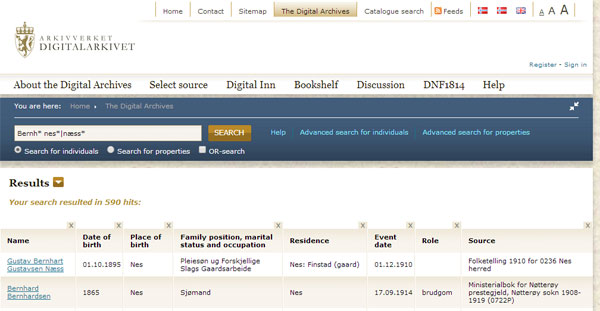UPDATE 13 DEC 2020- the archives have a new look and new site at: https://www.digitalarkivet.no/en/
Many of us Norwegian-American researchers have been complaining about the new archives and its search function. So I went to the talk by Finn Karlsen of the Digitalarkivet hoping to gain a better understanding. Of course the first thing he told us was that the old archive would die at the end of March as would the links we might have been using in our trees to reference data there. This is not news as we have been hearing it for a while.
After listening to him I thought I understood what I had been doing wrong with my searches at the new digital archive site – I had not understand how to correctly use wildcards there. Apparently the asterisk * wildcard can only be used at the beginning or end of a word, not in the middle. Also the pipe character | can be used as an OR.
Finn of course made it look easy with his examples of searching. He promises to have his presentation posted at his website [UPDATE 13-DEC-2020: site no longer available]
The simple search example he gave in his talk was
Bernh* nes*|næss*
So I tried that at home and got this:
But when I tried to find one of my own ancestors I did not do so well. I tried O* Gabrielsen and had no results but when I did just Gabrielsen there were hundreds of course and plenty started with an O. So I still do not understand how to use the search. I also tried this in the advanced search page with the same results.
UPDATE: I saw him in the library tonight and he explained that you need at least TWO letters with your wildcard. Now it works!
He was full of other good tips about Norwegian records. Here are a few of my favorites
- A child’s given name (first name) in the birth record was written by the minister the way he thought it should be, not necessarily as the parents meant it so in later records it can be different.
- Digitizations can be incorrect, particularly capital letters which can easily be misread, look elsewhere on the page of the source for that letter in the same handwriting to determine what it might really be.
- Names can be spelled many different ways by the census taker. For example he counted 86 ways for Elizabeth to be written in one census.
- Young boys emigrating often took name of farm they were working on! Not the original farm they were born on. Remember that farm names were actually addresses not surnames as we Americans think of them.
The main tip when working with the Advanced search is to keep refining it. For example, not so many records have the place of birth so he moved the farm name to the residence box and got more results.
Another time he removed the last name and put in the birth year and got better results. So keep fiddling with it!
It was a wonderful first day at Rootstech. I met many people I had corresponded with or heard of and was pleasantly surprised by how many knew of me and this blog! More soon.

1. Is there a timetable when each of the parish registers will be available on the Digitalarkivet. I’ve noticed that some years are there and some are not.
2. Are there Bygdebokas for other parishes, like the one for Hole Commune?:
Bygdeboka%20-%20salg%20-%20og%20digital%20nedlasting.%20-%20Hole%20kommune.webarchive
3. Thanks for your update.
There are no timetable for the church books. Most of the books that are not online yet, are still with the local minister. When the books are delivered to the Archive, they will be scanned and made available at Digitalarkivet.
If there are wholes in older series, that is because the books are missing.
Finn
I am sorry that I forgot to give the important information that any searches with wild cards has to contain at least two letters.
The only exception is if the word is only one letter, then you can search for that without any wildcard. But of course how would you know that?
Finn
At the latest Rootstech I saw Finn at the Family History Library and he told me that a wildcard in the middle of a name will now work. Thank you Finn!